Discover a new you with a healthy lifestyle change
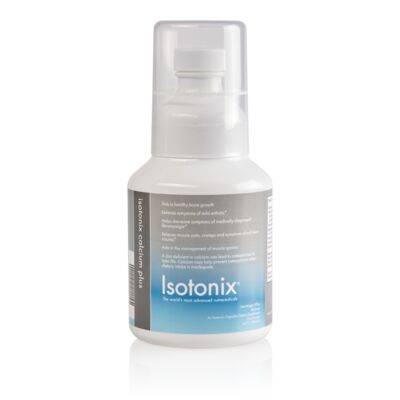
Isotonix® Calcium Plus
sku 713038
$49.75 AUD
$0.90 AUD Cashback
This product qualifies for free or reduced cost delivery. Learn More
Benefits
- *Helps relieve symptoms of mild medically diagnosed tenosynovitis
- *Helps decrease symptoms of medically diagnosed fibromyalgia
- *Relieve symptoms of stress
- *Relieve symptoms of menopause
- *Relieve irritability
- *Reduce mild migraine symptoms
- *Decrease symptoms of mild anxiety
- *Helps relieve symptoms of mild tension headache
- *Relieve symptoms of premenstrual tension
- *Relieve menstrual cramps
- *Relieve symptoms of mild sciatica
- *Relieve muscle pain
- *Relieve muscle cramps
- Helps promote blood circulation to the peripheral areas of the body (legs, hands and feet)
- Aids in healthy bone growth
- *Relieve symptoms of soft tissue trauma
- Aids in the management of muscle sprains
- A diet deficient in calcium can lead to osteoporosis in later life. Calcium may help prevent osteoporosis when dietary intake is inadequate.
- *Relieve symptoms of mild arthritis
- This vegetarian product contains no added wheat, soy, yeast, gluten, artificial flavour, salt, preservatives or milk
- Offered with the fastest and most efficient delivery system of all nutraceuticals - Isotonix
*If symptoms persist or worsen consult your medical practitioner or healthcare professional.
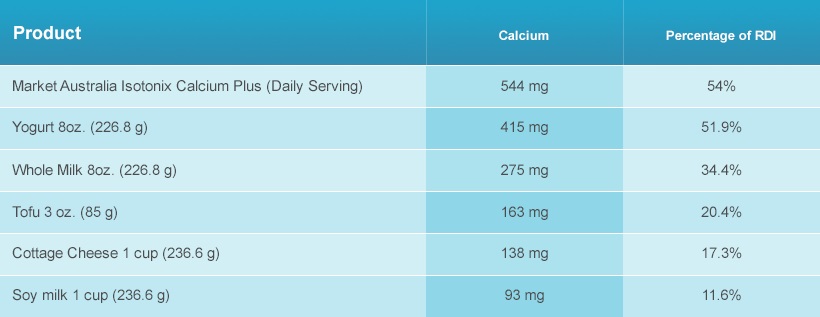
Product Classifications
Gluten-Free - The finished product contains no detectable gluten (<10ppm gluten)
Vegetarian - This product is vegetarian
Isotonic-Capable Drinkable Supplements - Easy-to-swallow supplements in liquid form are immediately available to the body for absorption
Quality Standards - GMP Operations and Standardised Ingredients
Checked For: Heavy Metals, Microbiological Contaminants, Allergens, Potency, Purity and Identity
Why choose Isotonix Calcium Plus?
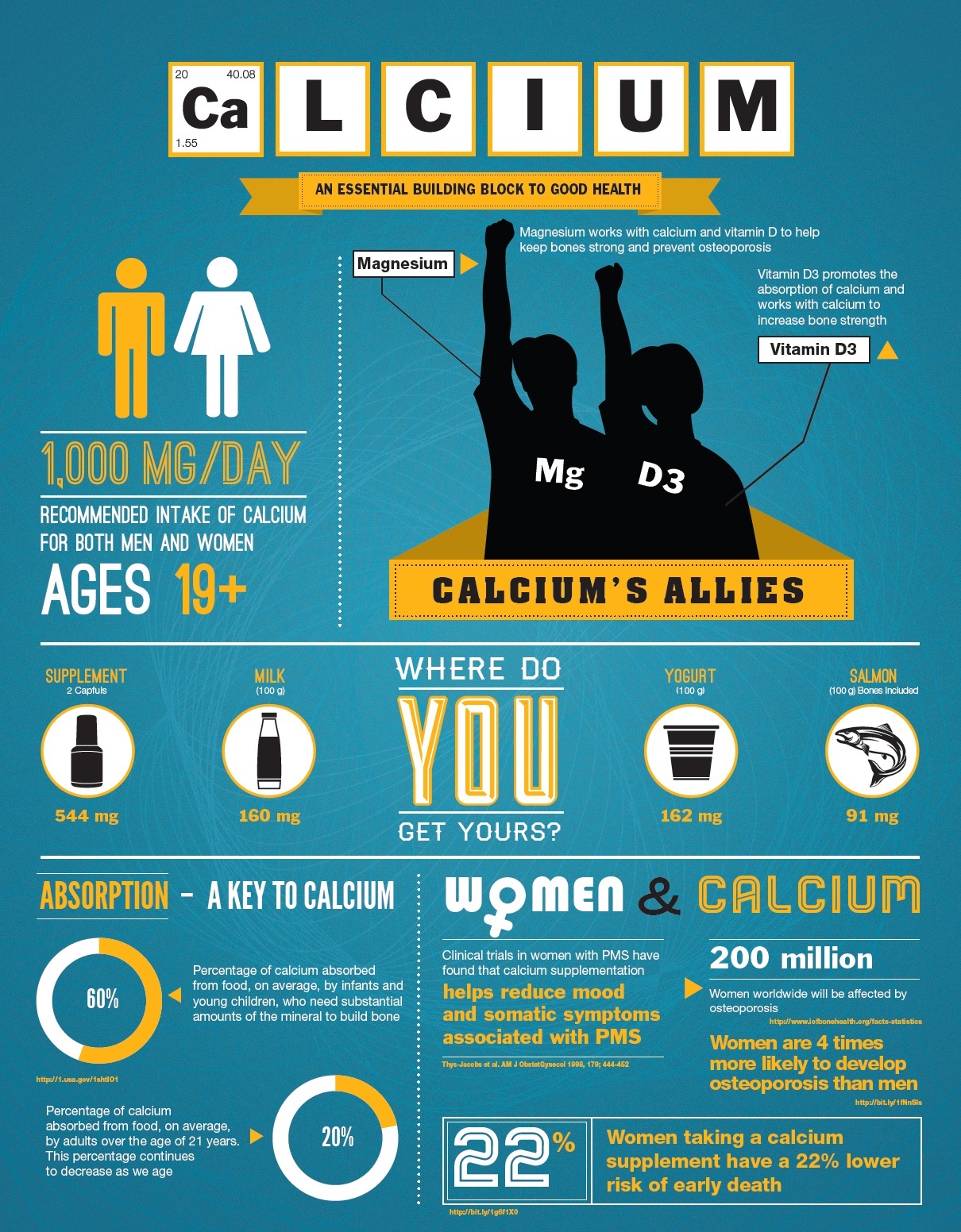
Calcium is essential for building and maintaining strong bones. Isotonix Calcium Plus provides the body with an optimal blend of calcium, vitamin D3, magnesium, and vitamin C in an efficient isotonic solution that is readily absorbed by the body. It is also formulated to relieve of muscular cramps, sprains and pains, relieve symptoms of mild arthritis, may assist in the prevention of osteoporosis, help promote blood circulation to the peripheral areas of the body, helps relieve symptoms of soft tissue trauma, among other benefits beyond your bones.
Isotonix Calcium Plus paves the way for powerful results since it is in an isotonic form rather than a tablet. Calcium in tablet form is difficult for your body to absorb. People may fail to absorb tablet calcium supplements because the calcium supplement is not blended with Vitamin D and magnesium; these are necessary to aid in the absorption and use of calcium. Even if the calcium tablet is blended correctly, it may be difficult for the body to utilise or break down the calcium. One explanation may be that many calcium brands use calcium from eggshell or oyster shell. These may not be well absorbed by the body. Another reason calcium may not be absorbed from a tablet is because of DCP, which is a binding agent used to hold the tablet together. DCP does not break down in the body.
In addition to binders, some calcium supplements may have additives such as chlorine and other chemicals. Even assuming no binders are used in the calcium tablet, the body must still break down a hard-pressed tablet into a usable form. If the tablet cannot be broken down sufficiently in the stomach, then the calcium will not be absorbed. If you can't break down the calcium your body is robbed of the calcium needed to support bodily functions.
Ordinary calcium tablets require stomach acid to dissolve its compounds, but Isotonix Calcium Plus has no need of stomach acid to be utilized because it delivers an efficient calcium solution that is more readily absorbed by the intestine with its unmatched isotonic delivery system – Isotonix.
Many calcium supplements exist in the marketplace, but only Market Australia's Isotonix Calcium Plus delivers a potent package of calcium and complementary nutrients through an isotonic system of delivery. This translates into a lower cost overall when compared to calcium supplements in pill form by making more of the active ingredients available to the body. Don't be misled by ingredient amounts. What really counts is the amount of active ingredients that your body can ultimately use.
Isotonix Delivery System
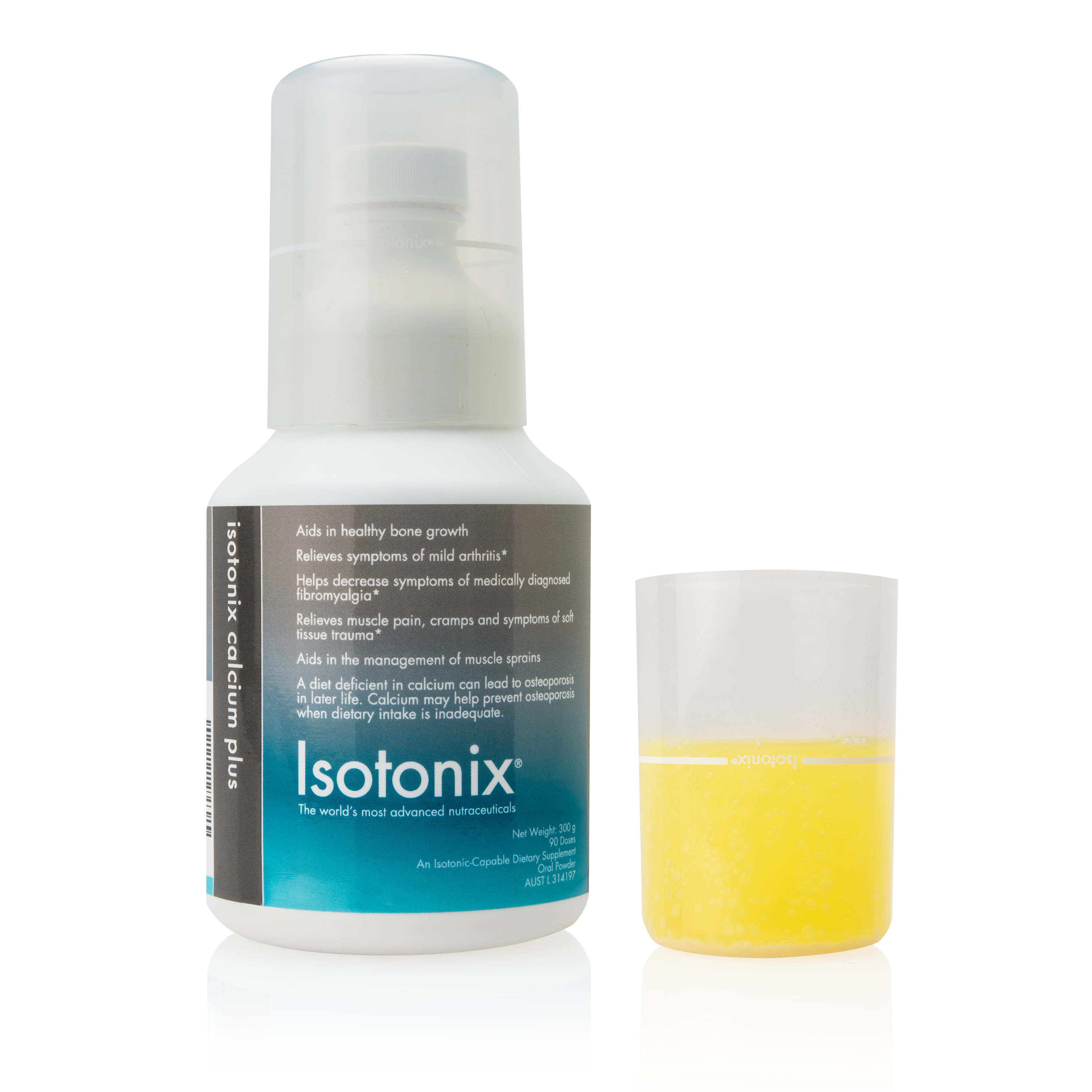
Isotonic, which means “same pressure,” bears the same chemical resemblance of the body’s blood, plasma and tears. All fluids in the body have a certain concentration, referred to as osmotic pressure. The body’s common osmotic pressure, which is isotonic, allows a consistent maintenance of body tissues. In order for a substance to be absorbed and used in the body’s metabolism, it must be transported in an isotonic state.
Isotonix dietary supplements are delivered in an isotonic solution. This means that the body has less work to do in obtaining maximum absorption. The isotonic state of the suspension allows nutrients to pass directly into the small intestine and be rapidly absorbed into the bloodstream. With Isotonix products, little nutritive value is lost, making the absorption of nutrients highly efficient while delivering maximum results.
Ingredients
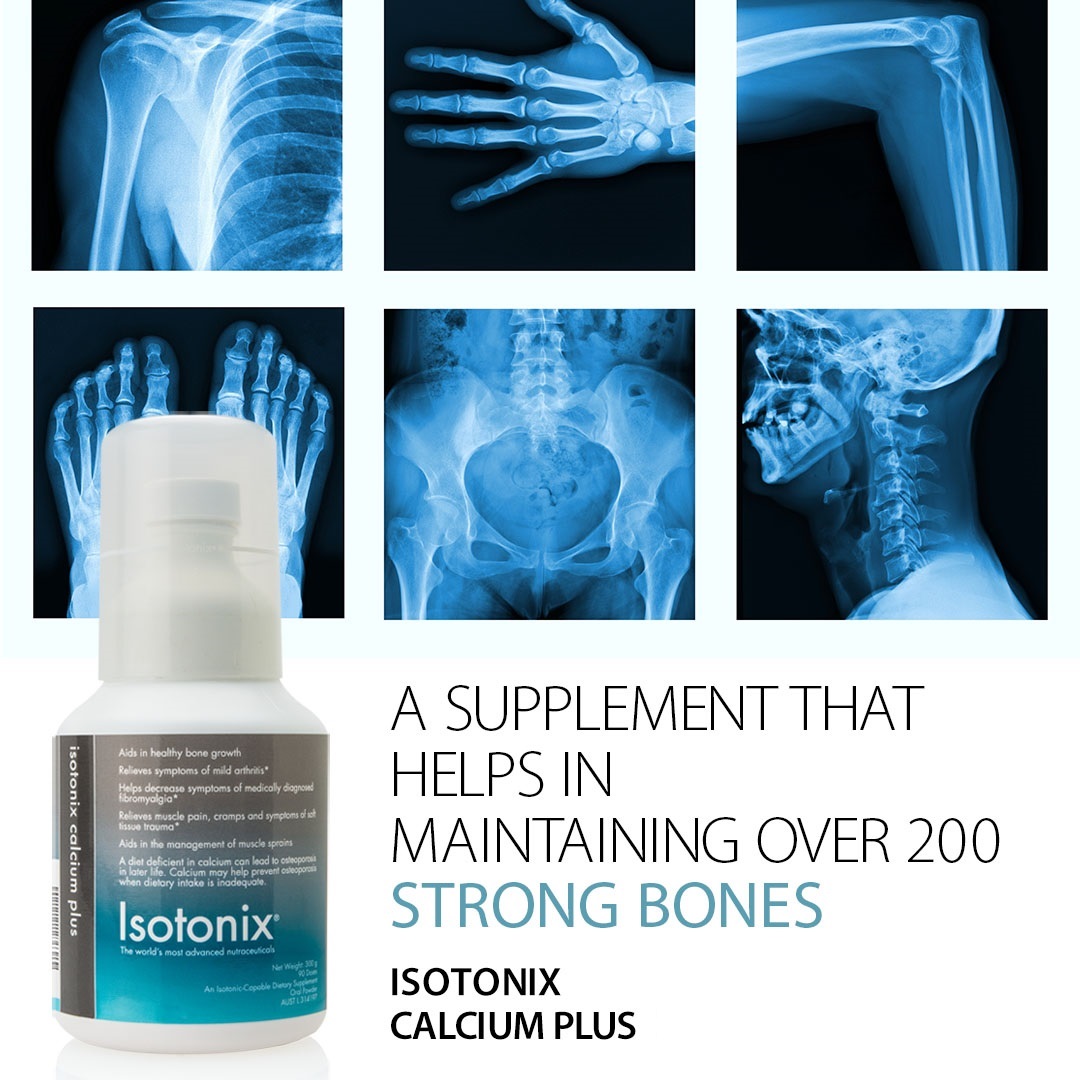
Calcium (Carbonate, Lactate, Phosphate, Sulfate, Citrate)
The highest concentration of calcium is found in milk. Other foods rich in calcium include vegetables such as collard greens, Chinese cabbage, mustard greens, broccoli, bok choy and tofu. Calcium is an essential mineral with a wide range of biological roles. Calcium exists in bone primarily in the form of hydroxyapatite (Ca10 (PO4)6 (OH)2).
Hydroxyapatite accounts for approximately 40% of bone weight. The skeleton has a structural requisite and acts as a storehouse for calcium. Apart from being a major component of bones and teeth, calcium is necessary for muscle contraction, nerve health, normal heart rhythms, blood coagulation, glandular secretion, energy production and supporting the immune system.
Sufficient daily calcium intake is necessary for maintaining optimal bone density, healthy bones and teeth and has been shown to ease the discomfort of PMS in women. Calcium deficiency has been associated with poor cardiovascular health, poor colon health and poor muscular function. When the body does not get enough calcium per day, it draws calcium from your bones possibly resulting in Osteoporosis. Osteoporosis is an age-related thinning of the bones, which may lead to a higher risk of broken hips, ribs, pelvis, weakened bones and stooped posture which comes from an accumulation of small fractures in the vertebrae. Adequate calcium as part of a healthful diet, along with physical activity, may reduce the risk of osteoporosis in later life. Bones become brittle with age, but a calcium rich diet combined with some exercise can go a long way keep bones strong.
The amount of calcium in the blood is regulated by PTH (parathyroid hormone). Some researchers believe when the body does not receive enough calcium, levels of PTH may increase, resulting in poor cardiovascular health. High levels of calcium in the body correlate with normal cardiovascular health and normal cholesterol levels. In the American Dietetic Association Journal a study revealed that calcium helped middle-aged women to maintain healthy weight levels.
Magnesium (Oxide, Carbonate)
Foods rich in magnesium include unpolished grains, nuts and green vegetables. Green leafy vegetables are potent sources of magnesium because of their chlorophyll content. Meats, starches, dairy products and refined and processed foods contain low amounts of magnesium. Recent research shows that our diets are magnesium deficient.
Magnesium is a component of the mineralized part of bone and is necessary for the metabolism of potassium and calcium in adults. It helps maintain normal levels of potassium, phosphorus, calcium, adrenaline and insulin. It's also important for the transporting calcium inside the cell for utilization. Magnesium plays a key role in the functioning of muscle and nervous tissue and the synthesis of all proteins, nucleic acids, nucleotides, cyclic adenosine monophosphate, lipids and carbohydrates. Magnesium helps slow the aging process by combating oxidative stress and lipid peroxidation.
Magnesium is required for energy release, regulation of the body temperature, proper nerve function, helping the body handle stress, and regulating metabolism. Importantly, magnesium is also required by the body to build healthy bones and teeth and normalizes muscle development. It works together with calcium and vitamin D to help keep bones strong and prevent osteoporosis. Magnesium, when combined with calcium, helps support the heart muscles in maintaining a regular heartbeat and promoting normal blood pressure.
Manganese (Sulfate)
Manganese is a mineral found in large quantities in both plant and animal matter. The most valuable dietary sources of manganese include whole grains, nuts, leafy vegetables and teas. Manganese is concentrated in the bran of grains, which is often removed during processing.
Only trace amounts of this element can be found in human tissue. Manganese is predominantly stored in the bones, liver, kidney and pancreas. It aids in the formation of connective tissue, bones, blood-clotting factors and sex hormones. It plays a role in fat and carbohydrate metabolism, calcium absorption and blood sugar regulation. Manganese is also necessary for normal brain and nerve function.
Manganese is a component of the antioxidant enzyme manganese superoxide dismutase (MnSOD). Antioxidants scavenge free radicals that can cause premature aging and oxidative stress to the body. These particles occur naturally in the body but can damage cell membranes, interact with genetic material and possibly contribute to the aging process. Antioxidants such as MnSOD can neutralize free radicals and may reduce or even help prevent some of the damage they cause.
Vitamin B2 (Riboflavin-5-Phosphate)
Vitamin B2 is a found in liver, dairy products, dark green vegetables and some types of seafood.
Vitamin B2 serves as a co-enzyme, working with other B vitamins. It promotes healthy red blood cell formation, supports the nervous system, respiration, antibody production and normal human growth. It supports healthy skin, nails, hair growth and helps regulate thyroid activity. Vitamin B2 plays a crucial role in turning food into energy as a part of the electron transport chain, driving cellular energy on the micro-level. Riboflavin can be useful for pregnant or lactating women as well as athletes due to their higher caloric needs. Vitamin B2 aids in the breakdown of fats while functioning as a cofactor or helper in activating B6 and folic acid. Vitamin B2 is water-soluble and cannot be stored by the body except in insignificant amounts. It must be replenished daily.
Under some conditions, vitamin B2 can act as an antioxidant. The riboflavin coenzymes are also important for the transformation of vitamin B6 and folic acid into their active forms and for the conversion of tryptophan into niacin.
Vitamin C (Ascorbic Acid)
The best food sources of vitamin C include all citrus fruits (oranges, grapefruit, lemons and tangerines), strawberries, tomatoes, broccoli, brussel sprouts, peppers and cantaloupe. Vitamin C is a "fragile" vitamin and can be easily destroyed by cooking or exposure of food to oxygen.
Vitamin C promotes a vitamin "sparing" effect, allowing your body to better utilise multiple vitamins and minerals such as thiamin, riboflavin, pantothenic acid, biotin, folic acid, B12, retinaldehyde and alpha-tocopherol and the mineral calcium. It's also a cofactor or helper in the metabolism of folic acid, some amino acids and hormones. Being an effective antioxidant, it also works in helping generate more vitamin E after oxygen radicals have attacked it, improving iron absorption from the small intestine. Vitamin C helps to regenerate active vitamin E in cell membranes. It is a co-factor in the synthesis of collagen and helps strengthen newly forming collagen. Vitamin C supports cardiovascular health, normal cholesterol levels and supports a healthy immune system.
Vitamin C has become the world's most popular vitamin. One reason is its ability to strengthen the immune system. The most convincing evidence suggesting the need for vitamin C supplementation is based on the fact that humans are incapable of producing vitamin C in their bodies.
Smoking and some drugs may also impair the body's ability to absorb vitamin C. Since it is water-soluble, vitamin C is flushed from the body each day. Since humans don't always eat foods containing an adequate amount of vitamin C, it often is beneficial to take a supplement.
Vitamin D3 (Cholecalciferol)
Regular sunlight exposure is the main way that most humans get their vitamin D. Food sources of vitamin D include vitamin D-fortified milk (100 IU per cup), cod liver oil, and fatty fish such as salmon and small amounts are found in egg yolks and liver.
Vitamin D promotes the absorption of calcium and phosphorus and supports the production of several proteins involved in calcium absorption and storage. Vitamin D works with calcium to increase bone strength and harden the bones. It works to increase active transport of calcium out of the osteoblasts into the extra-cellular fluid and in the kidneys. It also promotes calcium and phosphate re-uptake through the renal tubules and intestinal epithelium. It supports normal skin cell growth and aids the pancreas in producing insulin. Also, adequate calcium and vitamin D as part of a healthful diet, along with physical activity, may reduce the risk of osteoporosis in later life.
FAQ
Why should I take calcium?
Everyone needs calcium. Practically no one ingests enough calcium in their daily diet. Besides being helpful in supporting and maintaining bone integrity, calcium serves a dynamic role as a mineral. It's very important in the activity of many bodily enzymes and maintaining proper fluid balance. Calcium aids in the contraction of skeletal and muscle.
What are the directions for use?
Pour 1 level, white bottle capful (3.3 g) of powder into the clear overcap. Add water to the line on the overcap (60 ml) water and stir for 1 dose. Drink immediately after mixing is complete.
As a dietary supplement, this product is best taken twice daily: 1 capful in the morning and 1 capful in the evening or as directed by your healthcare provider. Maximum absorption occurs when taken on an empty stomach. This product is isotonic only if the specified amounts of water and powder are used.
I'm not an elderly woman. Why should I take a calcium supplement?
Calcium plays a huge role in regulating many major bodily processes with implications that extend far beyond the age factor. Other than elderly women who may be susceptible to bone loss, younger women, pregnant and lactating women, and men should take a calcium supplement.
Younger women need more calcium to build up the strength of their bones. Pregnant and lactating women need extra calcium to foster the healthy growth of new cells and of breast milk. Finally, those with poor cardiovascular health have been found to have low levels of calcium intake. Studies have confirmed the positive impact of calcium supplementation on heart health.
How can calcium help me lose weight?
Calcium plays a pivotal role within the body's cells, regulating both the storage and breakdown of fat. The more calcium there is in a fat cell, the more fat it will burn. Consuming dairy products has been shown to thwart weight gain.
I've heard calcium is great for PMS? How so?
PMS is an undesirable influence on physical and psychological peace of mind. Recent studies have found that over 70 percent of relationships are affected in some way by PMS. Supplementation with calcium can significantly reduce PMS symptoms.
Ovarian hormones affect calcium, magnesium and vitamin D metabolism. Estrogen regulates calcium metabolism, intestinal calcium absorption and parathyroid gene expression and secretion, triggering fluctuations across the menstrual cycle. As a woman is menstruating, her hormones are "all over the place". Clinical trials in women with PMS have found that calcium supplementation effectively alleviates the majority of mood and somatic symptoms.
What is the suggested age to begin taking Isotonix Calcium Plus?
Studies have shown that the most calcium absorption occurs in the early teen years.
Why is Isotonix Calcium Plus better than other calcium products?
It is better because of the Isotonix delivery system. When an isotonic substance enters the body, it will be absorbed into the bloodstream rapidly. With isotonic fluids, little nutritive value is lost making the absorption of nutrients highly efficient. There is nothing artificial about it. An isotonic fluid is nature's own nutrient delivery system.
Why is there a sandy residue left in the cup after mixing with water?
Everyone's water is different; some tap water has a higher concentration of minerals and the pH level of water differs depending on geographic location and the quality of the tap water, which can lead to inconsistencies with the saturation point of a solution. To ensure that our solutions reach the point of saturation, regardless of the pH or mineral levels in water, we have maximised the formulation amounts so that every serving of Isotonix Calcium Plus contains the correct amount of calcium. The residue left in the cup is due to over-saturation which is common in tap water with a higher pH level or a higher mineral content.
Who should use this product?
Everyone needs calcium. This product should be taken by women, especially those over the age of 20 to protect against the onset of osteoporosis. It is great for those who may be predisposed to bone loss or those who do not have an adequate intake of dairy products. It is necessary for growth and may be of special necessity for adolescents and pregnant females.
Science
- Abbott L, Nadler J, Rude RK. Magnesium deficiency in alcoholism: possible contribution to osteoporosis and cardiovascular disease in alcoholics. Alcohol Clin Exp Res. 1994; 18:1076-1082.
- Allender PS, Cutler JA, Follman D, et al. Dietary calcium and blood pressure: meta—analysis of randomized clinical trials. Ann Intern Med. 1996; 124:825-831.
- Altura BM, Altura BT. Role of magnesium and calcium in alcohol-induced hypertension and strokes as probed by in vivo television microscopy, digital image microscopy, optical spectroscopy, 31P-NMR, spectroscopy and a unique magnesium ion-selective electrode. Alcohol Clin Exp Res. 1994; 18:1057-1068.
- Baly DL, Schneiderman JS, Garcia-Welsh AL. Effect of manganese deficiency on insulin binding, glucose transport and metabolism in rat adipocytes. J Nutr. 1990; 120:1075-1079.
- Baron JA, Beach M, Mandel JS, et al. Calcium supplements for the prevention of colorectal adenomas. N Engl J Med 1999;340:101-107.
- Baron JA, Tosteson TD, Wargovich MJ, et al. Calcium supplementation and rectal mucosal proliferation: a randomized controlled trial. J Natl Cancer Inst 1995;87:1303-1307.
- Baxter GF, Sumeray MS, Walker JM. Infant size and magnesium: insights into LIMIT-2 and ISIS-4 from experimental studies. Lancet. 1996; 348:1424-1426.
- Beattie JH, Peace HS. The influence of a low-boron diet and boron supplementation on bone, major mineral and sex steroid metabolism in postmenopausal women. Br J Nutr. 1993 May;69(3):871-84.
- Bell L, Halstenson CE, Halstenson CJ, et al. Cholesterol-lowering effects of calcium carbonate in patients with mild to moderate hypercholesterolemia. Arch Intern Med. 1992; 152:2441-2444.
- Bostick RM, Kushi LH, Wu Y, et al. Relation of calcium, vitamin D, and dairy food intake to ischemic heart disease mortality among postmenopausal women. Am J Epidemiol 1999;149:151-160.
- Britton J, Pavord I, Richards K, et al. Dietary magnesium, lung function, wheezing, and airway hyper-reactivity in a random adult population sample. Lancet. 1994; 344:357-362.
- Buckley LM, Leib ES, Cartularo KS, et al. Calcium and vitamin D3 supplementation prevents bone loss in the spine secondary to low-dose corticosteroids in patients with rheumatoid arthritis. Ann Intern Med. 1996; 125:961-968.
- Casscells W. Magnesium and myocardial infarction. Lancet. 1994; 343:807-809.
- Christiansen CW, Rieder MA, Silverstein EL, Gencheff NE. Magnesium sulfate reduces myocardial infarct size when administered before but not after coronary reperfusion in a canine model. Circulation. 1995; 92:2617-2621.
- Christin Marandino, Vegetarian Times, August 1998
- Curhan GC, Willett WC, Speizer FE, et al. Comparison of dietary calcium with supplemental calcium and other nutrients as factors affecting the risk of kidney stones in women. Ann Intern Med. 1997; 126:497-504.
- Dawson-Hughes B, Harris SS, Krall EA, Dallal GE. Effect of calcium and vitamin D supplementation on bone density on men and women 65 years of age and older. N Engl J Med. 1997; 337:670-676.
- de Lourdes Lima M, Cruz T, Carreiro Pousada J, et al. The effect of magnesium supplementation in increasing doses on the control of type 2 diabetes. Diabetes Care. 1998; 21:682-686.
- Dietary Reference Intakes for Calcium, Phosphorous, Magnesium, Vitamin D, and Fluoride. Washington, DC: National Academy Press; 1997.
- Durlach J, Durlach V, Bac P, et al. Magnesium and therapeutics. Magnes Res. 1994; 7:313-328.
- Elisaf M, Merkouropoulos M, Tsianos EV. Siamopoulos KC. Pathogenetic mechanisms of hypomagnesemia in alcoholic patients. J Trace Elem Med Biol. 1995; 9:210-214.
- Facchinetti F, Borella P, Sances G, et al. Oral magnesium successfully relieves premenstrual mood changes. Obstet Gynecol. 1991; 78:177-181.
- Garland CF, Garland FC, Gorham ED. Calcium and vitamin D. Their potential roles in colon and breast cancer prevention. Ann NY Acad Sci. 1999; 889:107-119.
- Gong H, Amemiya T. Optic nerve changes in manganese-deficient rats. Exp Eye Res. 1999; 68:313-320.
- Gullestad L, Dolva LO, Soyland E, et al. Oral magnesium supplementation improves metabolic variables and muscle strength in alcoholics. Alcohol Clin Exp Res. 1992; 16:986-990.
Reviews
Displaying 1 - 5 of 9
27/2/2025
by Xiao LingH
Calcium review
Just got back my blood test report, my calcium level is good after taking this product
Response from Customer Service
27/2/2025
Thank you for sharing your positive experience with Isotonix® Calcium Plus! We're thrilled to hear that your latest report reflected a good calcium level, and we're glad to be part of your journey toward maintaining balance and wellness. Your feedback inspires us, and we appreciate your trust in our product. Thank you for choosing Isotonix® Calcium Plus and for sharing your story with us!
18/10/2022
by Anonymous
Some strange sticky stuff & residue left behind
After drinking the isotonix calcium, there seem to be some strange sticky stuff & residue left behind at the sides and bottom of the glass ?
I smeared it and it’s a little gooey?
What is this?
Response from Customer Service
20/11/2022
Dear Valued Customer,
Isotonix products have been carefully formulated to clear your stomach at an optimal rate to maximize absorption. When properly mixed with water and taken on an empty stomach, the isotonic solution flows into your small intestine almost immediately. The residue left behind does not affect the product potency and can be a result if the product has not be mixed/stirred with water prior to consuming.
Thank you
Market Australia
8/7/2021
by Anonymous
Love this calcium plus!
I sleep like a log! Bye bye headaches. love how this calcium is not just calcium, but calcium plus. have different types of calcium!
8/10/2020
by JIED
favorite calcium product
I used to take chemist calcium products but they were hard to swallow,all tablets and i couldn't remember to take them every day, but this product , it tastes good like beverage, even my mum loves this product, she s over 60, has been taking this for years and could tell the difference before and after as she didn't have any fractures or bone problems after she fell , she kept asking me to remember taking calcium every night
25/8/2020
by shu-ic
I can sleep much better with Isotonix calcium plus
Used to wake up at least once every night, but now i able to fall deep sleep and less dream !
- Prev
- Next


